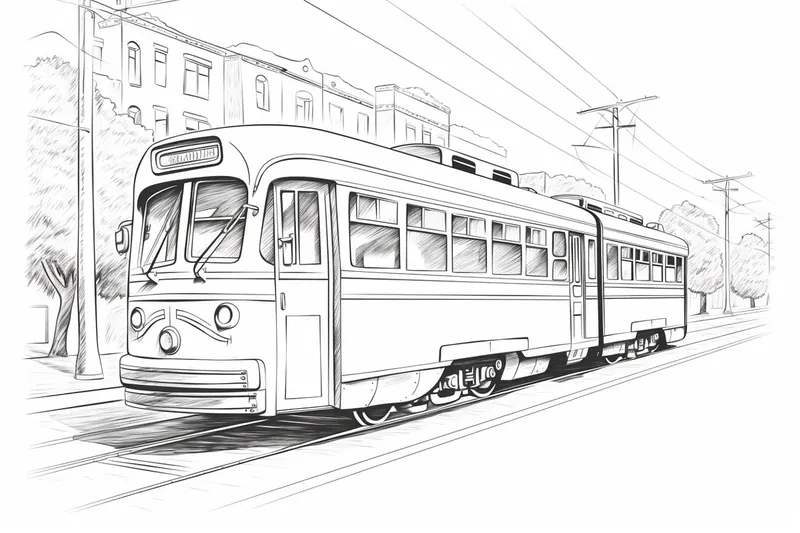How to Draw a Vintage Streetcar
Learn how to draw a charming vintage streetcar with this step-by-step guide! Perfect for aspiring artists interested in capturing the nostalgia of yesteryear.

Materials You'll Need
- Pencil
- Paper
- Eraser
 Drawing a vintage streetcar is more than just putting pencil to paper; it's a delightful journey into a world steeped in nostalgia and charm. These remarkable vehicles evoke memories of a simpler time, when communities thrived on the rhythm of streetcar lines connecting neighborhoods and bustling city centers. From their elegant curves and ornate facades to their vibrant colors and intricate designs, vintage streetcars are a feast for the eyes, making them a captivating subject for artists of all levels.
Drawing a vintage streetcar is more than just putting pencil to paper; it's a delightful journey into a world steeped in nostalgia and charm. These remarkable vehicles evoke memories of a simpler time, when communities thrived on the rhythm of streetcar lines connecting neighborhoods and bustling city centers. From their elegant curves and ornate facades to their vibrant colors and intricate designs, vintage streetcars are a feast for the eyes, making them a captivating subject for artists of all levels.
As you embark on this artistic adventure, you'll discover the unique beauty and rich history embedded in every line and detail of these iconic modes of transportation. Each stroke of your pencil can bring to life not only the streetcar itself but also the stories and environments surrounding them. By learning how to draw a vintage streetcar, you can capture a fleeting moment in time, allowing you to express your creativity while celebrating an important piece of transportation heritage.
Join me as we dive into the techniques and tips for rendering these timeless beauties on paper. Whether you're a seasoned artist or just starting your drawing journey, this guide will provide you with the steps needed to breathe life into your own vintage streetcar masterpiece. Let's get started on this artistic journey, celebrating the allure of vintage streetcars through the art of drawing!
Materials Required
- Drawing paper
- Pencils (2B, 4B, 6B)
- Eraser
- Blending stumps
- Colored pencils or markers (optional)
Step 1:
Start by sketching the basic shape of the streetcar. Draw a long rectangle for the body of the streetcar and add a smaller rectangle on top for the roof.
Step 2:
Add details to the front of the streetcar. Draw a smaller rectangle for the front window and add a curved line for the bumper.
Step 3:
Sketch the windows along the side of the streetcar. Use small rectangles to represent the windows, making sure they are evenly spaced.
Step 4:
Draw the wheels of the streetcar. Add two circles under the body of the streetcar to represent the wheels on one side. Make sure the wheels are aligned with each other.
Step 5:
Add more details to the streetcar, such as the door on the side and any additional features like lights or decorations.
Step 6:
Erase any unnecessary lines and refine the details of your drawing. Add shading to give the streetcar a three-dimensional look.
Step 7:
Add the tracks underneath the streetcar to place it in a realistic setting. Draw two parallel lines with small lines crossing them to represent the tracks.
Step 8:
Add background elements like buildings, trees, or people to enhance the overall scene and give context to your vintage streetcar drawing.
Step 9:
Finalize your drawing by adding any additional details or shading to make it more polished and refined. Step back and admire your vintage streetcar drawing!
Tip: When drawing a vintage streetcar, start by breaking down the complex shapes into simple geometric forms; for example, use rectangles for the body and circles for the wheels. This foundational approach will help you maintain proper proportions and perspective. Next, pay close attention to the details, such as the ornate decorations and the unique window shapes—these elements add character and authenticity to your drawing. Don't hesitate to use reference photos to capture the color palette and textures typically found in vintage streetcars; colored pencils or watercolors can help you achieve a vibrant finish. Lastly, remember to sketch lightly at first so you can easily make adjustments as you refine your drawing!
Conclusion
In conclusion, I want to commend you on your incredible work capturing the essence of the vintage streetcar. Your attention to detail and skill in depicting the scene is truly impressive. Remember to continue practicing and exploring different techniques to further enhance your artistic abilities. Your passion for art shines through in your work, and I have no doubt that you will continue to create beautiful pieces that inspire and delight others. Keep up the great work and never stop pursuing your artistic vision!
Fun Facts About Vintage Streetcars
- Vintage streetcars were originally introduced in the late 19th and early 20th centuries as a mode of public transportation in cities around the world.
- Some vintage streetcars were powered by horses before electricity became the standard power source for streetcar systems.
- San Francisco's iconic cable cars are a type of vintage streetcar that operate on underground cables to move along the city's steep hills.
- Vintage streetcars can be found in cities such as New Orleans, Melbourne, Lisbon, and Toronto, where they are still in operation as a tourist attraction or part of the public transportation system.
- Many vintage streetcars have been beautifully restored to their original glory, featuring intricate detailing, wooden interiors, and vintage advertisements.
- Some vintage streetcars have been retrofitted with modern amenities such as air conditioning, wheelchair accessibility, and GPS tracking systems while still maintaining their historic charm.
- Vintage streetcars often have dedicated routes or loops that showcase historic districts and waterfronts.
Suggestions for Scenes and Settings for Vintage Streetcar Drawings
Certainly! Here are some suggestions for scenes and settings for drawings of vintage streetcars:
- An old cobblestone street in a historic downtown area, with the vintage streetcar trundling along the tracks past charming shops and cafes.
- A bustling city square during the early 20th century, with the streetcar in the foreground and people in period clothing going about their day.
- A scenic coastal town with palm trees swaying in the breeze, and a vintage streetcar running along the waterfront promenade.
- A snowy winter scene with the vintage streetcar making its way through a picturesque village dusted with snow, with a backdrop of snow-capped mountains.
- An industrial cityscape with factories and warehouses lining the street, and the vintage streetcar rumbling past smokestacks and steam engines.
- A rural landscape with rolling hills and farms, and a vintage streetcar chugging along a track that cuts through the countryside.